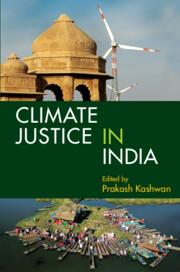Book contents
- Frontmatter
- Contents
- List of Poems and Artworks
- List of Tables
- List of Figures
- List of Abbreviations
- Preface and Acknowledgements
- 1 Introduction: Climate Justice in India
- 2 Urban Climate Justice in India
- 3 How Just and Democratic Is India’s Solar Energy Transition?: An Analysis of State Solar Policies in India
- 4 Extractive Regimes in the Coal Heartlands of India: Difficult Questions for a Just Energy Transition
- 5 Climate Justice Implications of the Relationship between Economic Inequality and Carbon Emissions in India
- 6 Climate Action Plans and Justice in India
- 7 Social Mobilizations for Climate Action and Climate Justice in India
- 8 Reimagining Climate Justice as Caste Justice
- 9 Intersectional Water Justice in India: At the Confluence of Gender, Caste, and Climate Change
- 10 Realizing Climate Justice through Agroecology and Women’s Collective Land Rights
- 11 Conclusion: Pathways to Policies and Praxis of Climate Justice in India
- About the Editor and Contributors
- About the Poets and Artists
- Index
11 - Conclusion: Pathways to Policies and Praxis of Climate Justice in India
Published online by Cambridge University Press: 03 November 2022
- Frontmatter
- Contents
- List of Poems and Artworks
- List of Tables
- List of Figures
- List of Abbreviations
- Preface and Acknowledgements
- 1 Introduction: Climate Justice in India
- 2 Urban Climate Justice in India
- 3 How Just and Democratic Is India’s Solar Energy Transition?: An Analysis of State Solar Policies in India
- 4 Extractive Regimes in the Coal Heartlands of India: Difficult Questions for a Just Energy Transition
- 5 Climate Justice Implications of the Relationship between Economic Inequality and Carbon Emissions in India
- 6 Climate Action Plans and Justice in India
- 7 Social Mobilizations for Climate Action and Climate Justice in India
- 8 Reimagining Climate Justice as Caste Justice
- 9 Intersectional Water Justice in India: At the Confluence of Gender, Caste, and Climate Change
- 10 Realizing Climate Justice through Agroecology and Women’s Collective Land Rights
- 11 Conclusion: Pathways to Policies and Praxis of Climate Justice in India
- About the Editor and Contributors
- About the Poets and Artists
- Index
Summary
Introduction
Anil Agarwal and Sunita Narain published a remarkable report in 1991 in which they differentiated between ‘survival emissions’ and ‘luxury emissions’. It would not be an exaggeration to say that no other report has had a comparable impact on global debates and scholarship on climate justice. This distinction between survival and luxury emissions has been central to some of the most important pieces of scholarship and advocacy on climate justice (Shue 1993). Based on this report, common but differentiated responsibilities (CBDR) became the defining feature of the Indian government's position in international climate negotiations (Jasanoff 1993). Despite having such a massive influence on international climate negotiations, the distinction between survival and luxury emissions is rarely referenced in domestic climate policy debates. Even as climate disasters, including cyclones, floods, and heatwaves, become more intense, there is limited public debate on climate action and policy in India (J. Das 2020). On the other hand, while there is robust scholarship on India's climate policy and action in the international arena, engagement with questions of domestic climate justice within Indian academia is quite sparse (Fisher 2015; Chu and Michael 2019). The potential for domestic injustices was apparent even in 1991 and was duly acknowledged in the same Centre for Science and Environment (CSE) report that made CBDR foundational to India's position in international negotiations:
Can we really equate the carbon dioxide contributions of gas guzzling automobiles in Europe and North America or, for that matter, anywhere in the Third World with the methane emissions of draught cattle and rice fields of subsistence farmers in West Bengal or Thailand? Do these people not have a right to live? But no effort has been made in WRI's report to separate out the ‘survival emissions’ of the poor, from the ‘luxury emissions’ of the rich. (Agarwal and Narain 1991, 3, italics added for emphasis)
For a variety of reasons that require deeper inquiry, questions of domestic climate justice fell through the intertwined cracks of international climate change politics and sectoral silos that are endemic to both academic research and grassroots social movement organization (Gupta 2014). Many argued, quite appropriately, that the policy priority should be addressing issues of employment, food security, education, and primary healthcare for the poorest people in India and other countries in the Global South.
- Type
- Chapter
- Information
- Climate Justice in India , pp. 229 - 245Publisher: Cambridge University PressPrint publication year: 2024
- Creative Commons
- This content is Open Access and distributed under the terms of the Creative Commons Attribution licence CC-BY-NC 4.0 https://creativecommons.org/cclicenses/



